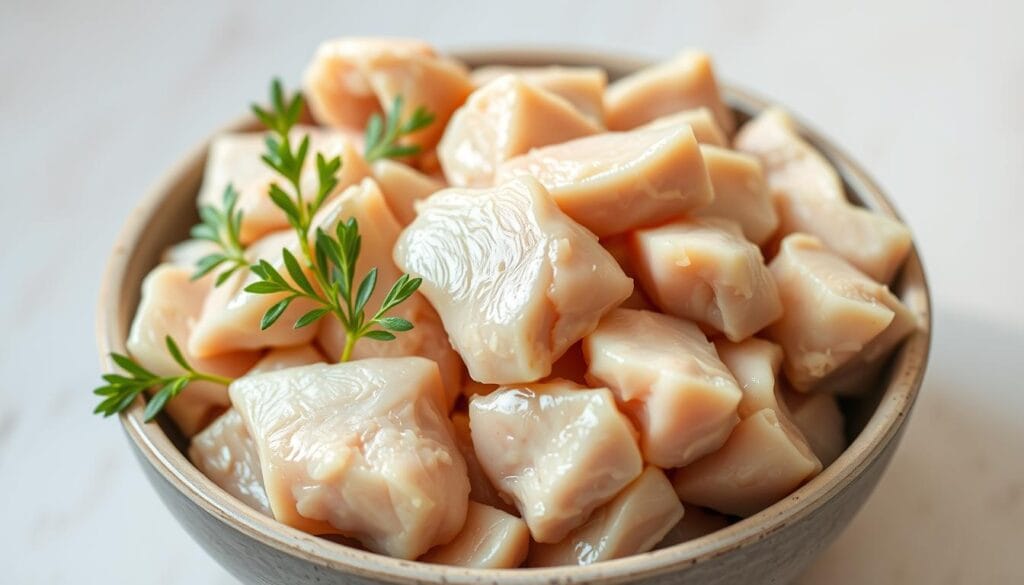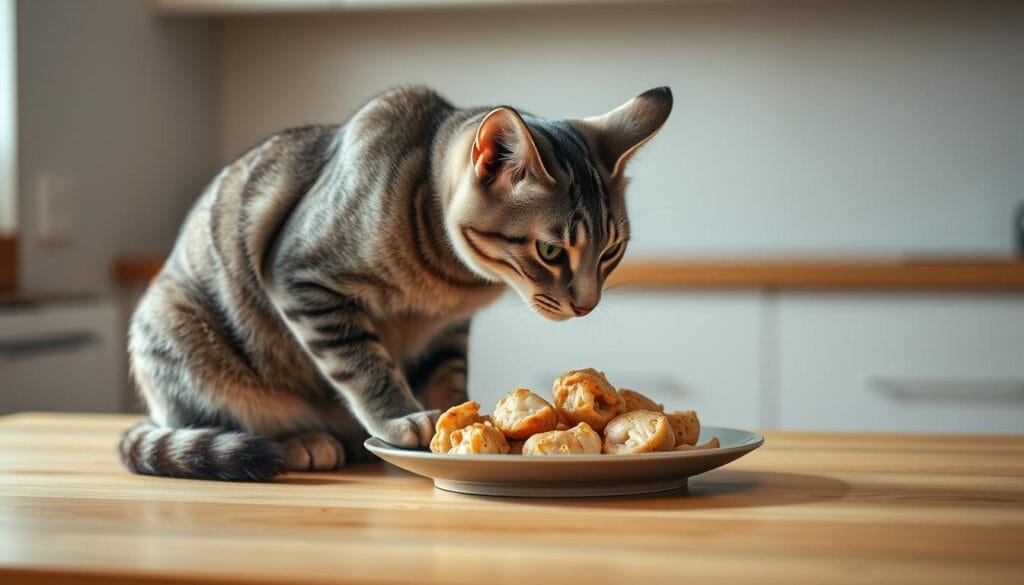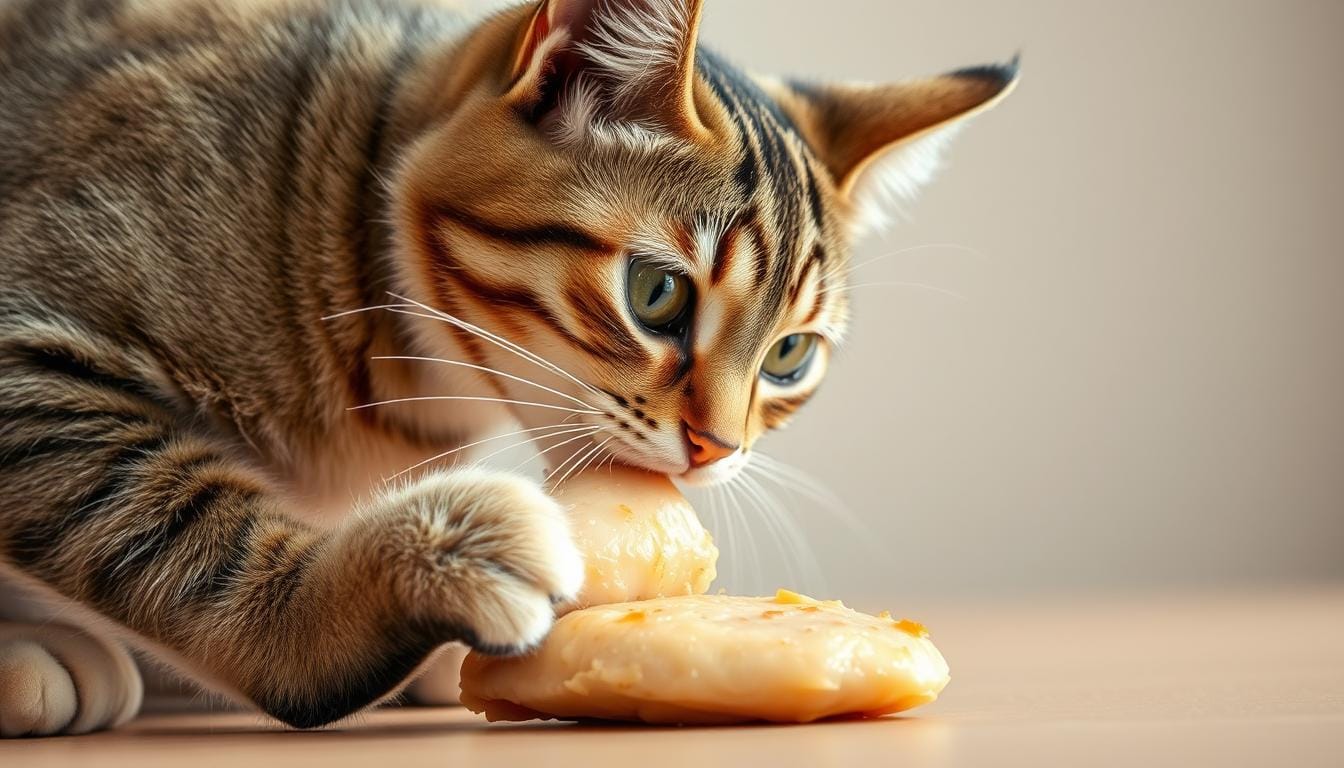Can cats have chicken as a protein source? Comprehensive guide
Every cat owner has looked down at their plate of roasted chicken and wondered: can cats eat chicken, or more specifically, can cats have chicken as part of their diet? The bond between cats and their human companions often centers around shared moments, including mealtime curiosities. As a devoted pet parent, understanding what is chicken good for cats becomes crucial for your feline friend’s nutrition.
Cats are natural carnivores with a biological need for high-quality protein sources. Chicken emerges as an excellent dietary option that aligns perfectly with their nutritional requirements. When considering whether cats can eat chicken, or asking yourself, “can cats have chicken safely?”, veterinary nutritionists generally agree that lean, properly prepared chicken can be a fantastic protein supplement for your cat’s diet.
Table of Contents
Your furry companion’s digestive system is specifically designed to process animal proteins. Chicken provides essential amino acids and nutrients that support muscle development, energy levels, and overall health. Not all chicken preparations are equal, which makes understanding safe feeding practices critical for responsible pet ownership.
Whether you’re exploring homemade meal options or seeking to diversify your cat’s protein intake, chicken offers a promising nutritional pathway. The key lies in preparation, portion control, and understanding your individual cat’s specific dietary needs.
Understanding Chicken as a Protein Source for Cats
Cats are obligate carnivores with unique nutritional requirements. When considering is chicken good for cats, pet owners discover an excellent protein source that can significantly benefit their feline companions. Chicken provides a nutrient-dense food option that supports your cat’s overall health and well-being.

The Role of Protein in Feline Nutrition
Protein plays a critical role in your cat’s diet. Unlike many other animals, cats require a high-protein diet to maintain muscle mass, support organ function, and generate essential energy. Is chicken good for cats? Absolutely. Chicken offers a complete protein profile that meets these specific nutritional demands.
- Supports muscle development
- Provides essential energy
- Maintains healthy organ function
Essential Amino Acids in Chicken
Chicken contains vital amino acids that cats cannot produce independently. Taurine, a particularly crucial amino acid, is abundantly found in chicken. This compound supports heart health, vision, and reproductive functions in cats.
Nutritional Benefits of Chicken for Cats
When prepared correctly, chicken offers remarkable nutritional advantages. It delivers lean protein, contains minimal fat, and provides essential nutrients that support your cat’s immune system. Pet owners seeking a nutritious protein source will find chicken an ideal choice for feline dietary needs.
- High-quality protein source
- Low in fat
- Rich in essential nutrients
Can Cats Have Chicken?

When wondering if cats can eat chicken, the answer is a resounding yes! Chicken can be a nutritious protein source for your feline friend when prepared and served correctly. Cats are obligate carnivores, which means they thrive on animal proteins, and chicken is an excellent option.
Before you start feeding chicken to your cat, consider these important guidelines:
- Always serve chicken plain and cooked
- Remove all bones and skin
- Cut chicken into small, manageable pieces
- Limit chicken to a small portion of their diet
Nutritional experts recommend that can cats eat chicken in moderation. Chicken should not replace a balanced cat food diet but instead serve as a supplemental protein source. Veterinarians suggest that chicken should comprise no more than 10% of your cat’s daily caloric intake.
Potential risks exist when feeding chicken to cats. Overfeeding can lead to nutritional imbalances and potential weight gain. Raw chicken poses additional health risks, including bacterial contamination. Always consult with your veterinarian to ensure you’re providing the best dietary approach for your specific cat’s needs.
When introducing chicken to your cat’s diet, start with small amounts and observe how your cat responds. Some cats might have individual sensitivities or allergies, so careful monitoring is crucial.
Different Forms of Chicken for Cats
Feeding chicken to your cat requires careful consideration of preparation methods and product types. Not all chicken options are equally safe or nutritious for felines. Understanding the various forms of chicken can help you make informed dietary choices for your furry companion.
Cooked vs Raw Chicken
When considering can cats eat raw chicken, veterinary experts strongly recommend against raw meat options. Raw chicken poses significant health risks due to potential bacterial contamination. Salmonella and other harmful pathogens can seriously threaten both your cat’s and your family’s health.
- Cooked chicken is the safest option for cats
- Raw chicken increases risk of bacterial infections
- Always remove bones before serving
Store-bought vs Homemade Options
If you want to feed your cat chicken, multiple preparation methods exist. Store-bought options like canned chicken or specialized cat foods provide convenient nutrition. When you can i feed my cat raw chicken is questioned, homemade cooked chicken emerges as a safer alternative.
| Chicken Type | Safety Level | Nutritional Value |
|---|---|---|
| Raw Chicken | High Risk | Potentially Dangerous |
| Cooked Chicken | Safe | High Protein |
| Canned Chicken | Moderate | Good Nutrition |
Chicken Products to Avoid
Not all chicken products suit feline dietary needs. Fried chicken, seasoned meats, and processed chicken with added salt or spices should be completely avoided.
- Skip fried chicken varieties
- Avoid seasoned or spiced chicken
- Remove skin and excess fat
Ultimately, plain, cooked chicken serves as an excellent protein source for cats when prepared carefully and served in moderation.
Safe Preparation and Serving Methods
When considering can cats eat chicken, proper preparation is crucial for your feline friend’s health and safety. Raw chicken can harbor dangerous bacteria that might harm your cat, so cooking is essential.
Here are the recommended steps to prepare chicken for cats:
- Choose boneless, skinless chicken breast as the safest option
- Cook chicken thoroughly without any seasonings or additives
- Use plain baking or boiling methods
- Ensure chicken reaches an internal temperature of 165°F
Cooking techniques play a significant role in safely serving chicken to cats. Boiling is often the simplest method, as it requires no additional oils or fats. Baking works equally well when done plain.
| Preparation Method | Recommended for Cats | Preparation Time |
|---|---|---|
| Boiling | Excellent | 10-15 minutes |
| Baking | Very Good | 20-25 minutes |
| Grilling | Not Recommended | N/A |
After cooking, let the chicken cool completely. Cut it into small, bite-sized pieces that are easy for your cat to eat. Remove all bones, skin, and visible fat. When introducing chicken to your cat’s diet, start with small portions to monitor their reaction.
Potential Risks and Considerations
When considering can I feed my cat raw chicken, pet owners must understand the significant health risks involved. Raw chicken can harbor dangerous bacteria like Salmonella and E. coli, which pose serious threats to your cat’s digestive system. Uncooked meat increases the likelihood of food-borne illnesses that could compromise your pet’s health.
Chicken bones present another critical danger. They can easily splinter and cause internal injuries or become lodged in your cat’s throat, creating a potentially life-threatening choking hazard. If you want to feed chicken to your cat, always remove bones completely and opt for boneless, cooked chicken prepared without seasoning.
Nutritional balance is crucial when introducing chicken to your cat’s diet. While protein is essential, feeding only chicken might lead to nutritional deficiencies. Some cats may also develop allergies or sensitivities to chicken. Start with small portions and closely monitor your cat’s reaction when introducing this protein source.
Always consult with a veterinarian before making significant changes to your cat’s diet. Professional guidance can help you determine the safest approach to feeding chicken and ensure your cat receives a balanced, nutritious meal plan tailored to their specific health requirements.
- Dry Cat Food Brands Loved by Cats and Trusted by Vets
- Best Cat Food for Sensitive Stomach:Top 5 Vet-Approved Picks
- Special Kitty Kitten Food – Learn the Pros and Cons
- prescription cat food-Top 10 Prescription Cat Foods
- Wet Cat Food for Kittens: Top Nutritious Choices 2025
- How Long Can Wet Cat Food Sit Out? Critical Facts
- American Veterinary Medical Association (AVMA)

